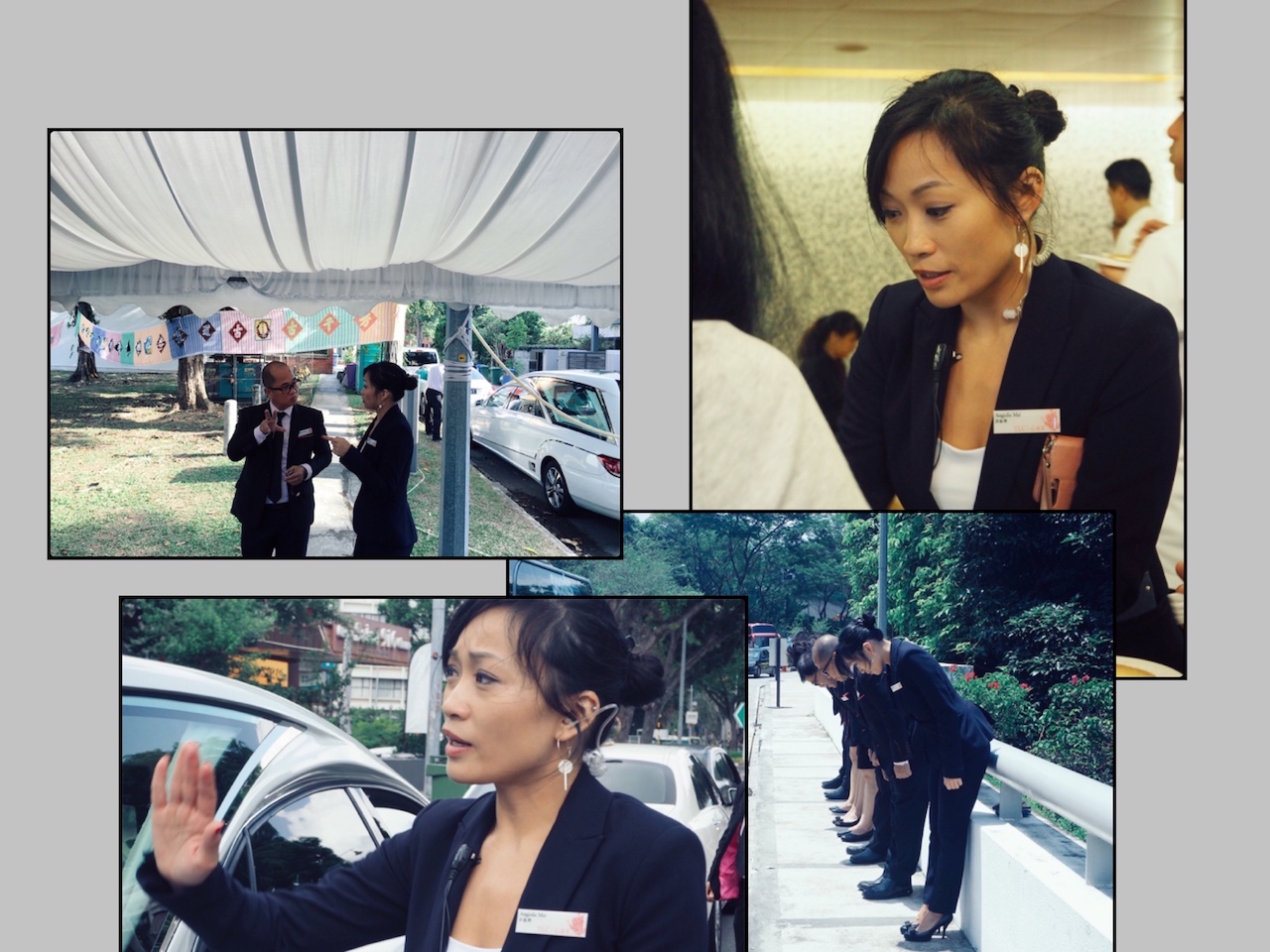At a stranger’s wake in the middle of a field in Siglap, I watch family members take turns to approach a casket to pay their respects. Their wails punctuate the air, and their grief-stricken faces are stained with tears.
Standing stoically at the back of the tent, I blink profusely to maintain my composure. Without warning, a tear slides down my cheek.
Yes, I am crying over a 99-year-old man, whom I have never met in my life.
Barely an hour ago, when I first arrived, I felt like an intruder. It took me almost half an hour to get used to the odd stare from a family member or friend, silently questioning who I was and what I was doing there.
To myself, I whispered, I am here because I am learning how to do a funeral director’s job.
Specifically, I was there to understand every step that Angjolie Mei, the 37-year-old funeral director and founder of The Life Celebrant (TLC), oversees at wakes and funeral services, from chaperoning the deceased’s spouse to distributing water bottles to guests.
A week ago, when Angjolie suggested this day as an opportunity to shadow her, I don’t mention that this will be the first wake and funeral service I’m attending in my life.
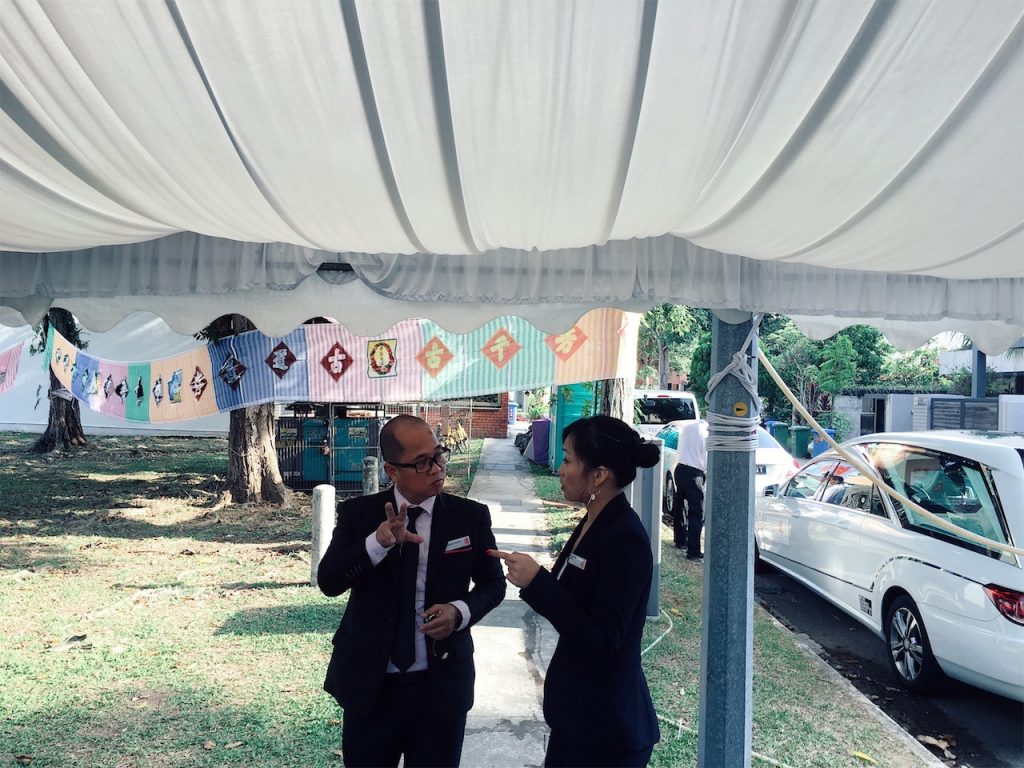

8 AM: Tiong Bahru
Angjolie pulls up to the taxi stand at Tiong Bahru Plaza to pick me up. She is dressed in a navy blue pant-suit, with simple silver hoop earrings. Her bright red nails complement her lipstick in the same shade, and her eyeliner is impeccably drawn.
On the 30-minute drive down to Siglap, she gives me the lowdown on the family whose mourning I am about to witness.
This is a huge family, she explains, which comes with challenges.
“Different family members may request for different things. It could even be about something small, like where to set up drinks. My team tries to mitigate conflicting advice from family, but we don’t fight back against our client. My job and the funeral arranger’s role is to ask the family to assign one member we can report to.”
When she first started out in the industry, Angjolie used to be the emcee for funerals where she was also the funeral director. She has since stopped juggling so many roles; these days, “if a funeral doesn’t require [her] presence, then [she] won’t appear”, allowing her team to handle it instead.
For today’s funeral, she was personally contacted by the daughter of the deceased.
Where death is concerned, the end is never quite ‘expected’, even in cases of old age and illness. Once they start to deteriorate, everything happens quickly, so being on the ball is key. Early last week, Angjolie’s team sent the family an initial quotation for the funeral. Within a few days, the deceased passed on and they finalised the quotation.
“I gave the family a breakdown of how much space they would need. You know how to gauge these things after having planned so many funerals. But if you haven’t planned one within the last 10 years, you might be shocked at the price. You can’t expect funerals to be cheap, especially if you want it ‘nicer’.”
Her admission makes me think of a friend, who was recently appalled at how much her grandmother’s funeral cost.
Like a wedding, Angjolie says there are different ‘packages’ to meet different budgets and needs. Knowing that cost is the last thing a family wants to worry about when their loved one has passed away, she does everything she can to ease the family’s burden.
Once, this involved settling funeral details with a temple while the family had their hands tied entertaining guests.
She says, “My job is make sure everyone is taken care of, and most importantly that the wishes of the deceased are met.”
Before we get out of the car, Angjolie reaches for a hair clip to bun up her hair. It’s imperative that she looks as professional as possible before meeting the family.
Today, they need all the reassurance that everything will go according to plan.
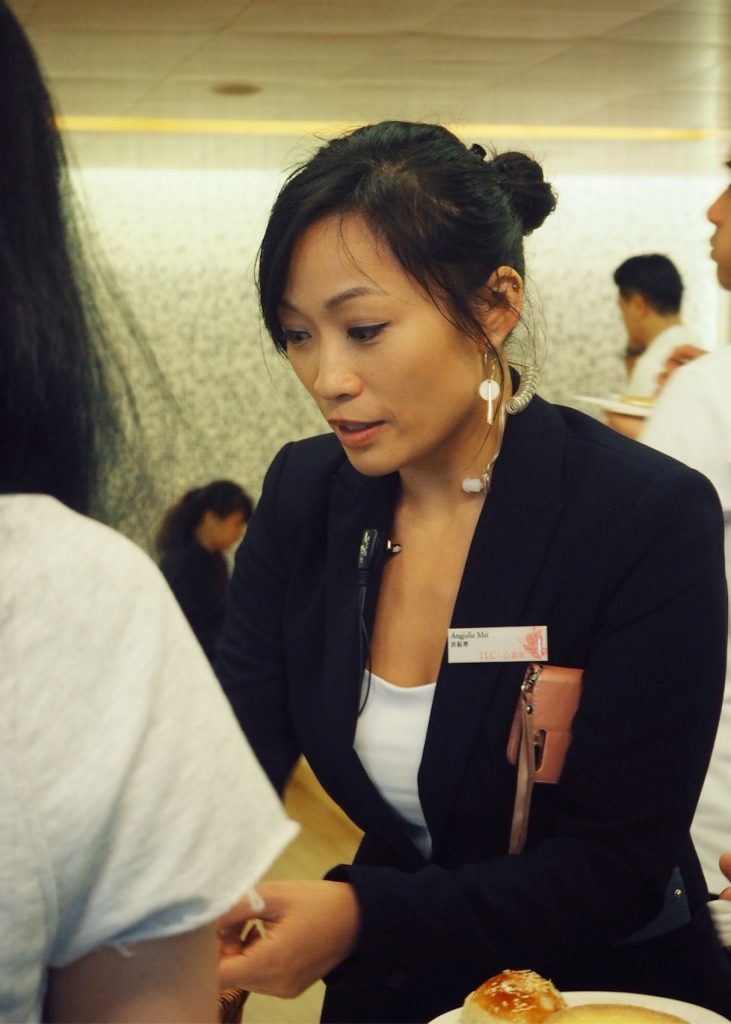
8:30 AM: Siglap
Upon reaching the wake, I am free to ‘roam’ or observe from the side. Angjolie briefs her hospitality and operations teams, ensuring they are all clear about their roles for the day.
Before she begins carrying out her own duties, she approaches the flower-lined altar to pay respects to the deceased. Then she steps to the side, checking that all buses are on schedule to ferry the family and guests to Mandai Crematorium and Columbarium afterward.
Throughout the day, Angjolie talks on one phone and texts on another. She also assists in handing out bottled water to the guests, and pulls up extra chairs for them.
At one point, she even runs into the narrow two-lane road beside the field to ensure a garbage disposal truck doesn’t hit TLC’s funeral vehicles.
After most family members finish taking turns to pay respects at the casket, Angjolie approaches an elderly woman and speaks to her quietly, gently placing her hand on the woman’s arm. Together, they walk up to the casket.
Later I find out that this woman is the deceased’s wife and that she was originally hesitant about viewing her late husband one last time. In situations like this, where Angjolie is torn between respecting the family member’s wishes and not wanting them to regret their decision, she always does a final check in, just in case they change their minds.
The deceased’s wife also asks Angjolie to allow time for the family’s seven domestic helpers to pay their respects, even though this isn’t scheduled. After all, they too took care of her late husband.
It’s oddly moving to witness these domestic helpers, sobbing and heaving, collapse into their employers’ embrace. For today at least, they are family.
As the wake wraps up, the TLC team guides the family and guests to the road, where they will walk for a short distance behind the hearse. Even though there’s a high amount of coordination, the instructions from the emcee are clear, and the crowd moves in an orderly manner.
This may be a wake, but for Angjolie and her team, it’s also an event.
Funeral teams are essentially event organisers who juggle emotions, schedules, and logistics. Their KPI is to provide the family peace of mind by ensuring every funeral runs smoothly.
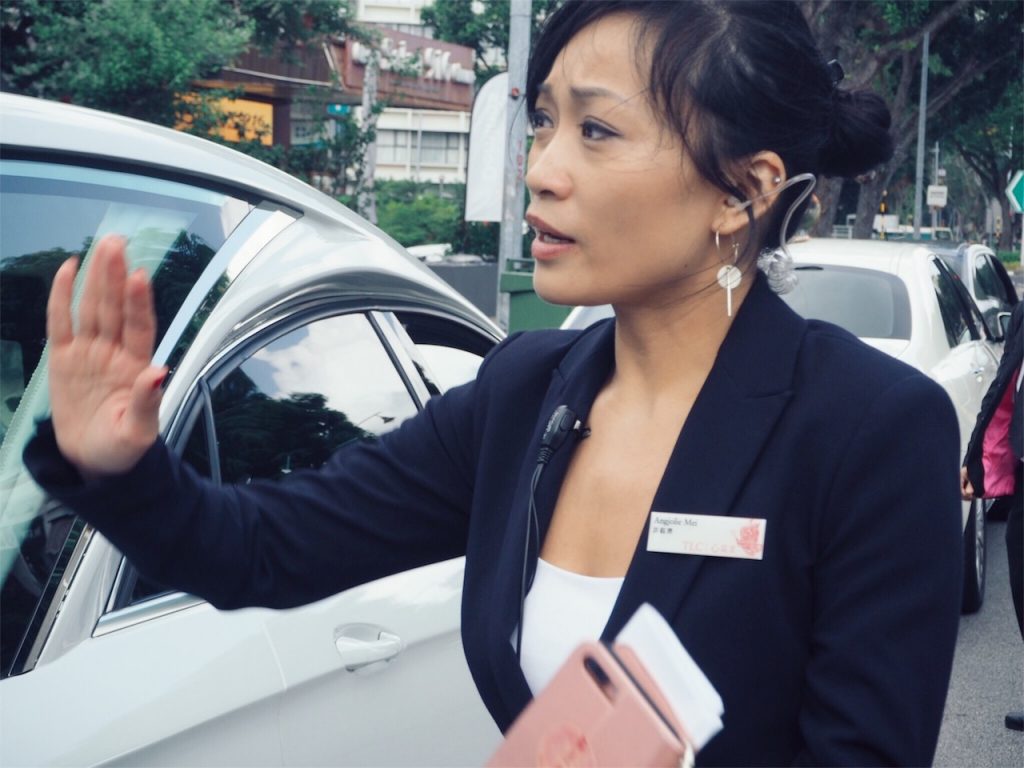

10:30 AM: The Road
As funeral director, Angjolie walks ahead of the hearse with the funeral arranger, her right hand man for the day. They direct traffic and take care of the funeral party, making sure everyone stays safe and keeps to the slowest lane.
She has instructed the convoy to keep their headlights and hazard lights switched on, as well as to maintain some distance between each car so other vehicles can cut in if they need to.
When Angjolie mentions to the deceased’s wife that spouses weren’t encouraged to see their departed spouse off in olden times, she finds out that the wife does want to see her late husband one last time. She also requests to walk a little further than was originally planned by Angjolie.
“When we look at individual family dynamics, sometimes we just have to be understanding. Know what the family wants and see how you can accommodate,” says Angjolie.
After the short distance, Angjolie directs family and guests to board their respective buses before driving down to Mandai herself. The funeral director used to take the position of lead car, but has since let her team take charge.
In the car, she shares that it took awhile for people to take her seriously when she first established TLC.
Yet I imagine how quickly they realised they were underestimating her. As someone who hasn’t planned a funeral before, I can see how her no-nonsense attitude and unflappable demeanor would give me the confidence I need to make sure a loved one gets the farewell they deserve.
Angjolie shares, “When I first started, there were times when people didn’t trust me to do things. They thought I was just a small girl. The only solution is to do it; show them it can be done. Now people don’t challenge me anymore, because they know I will come in and do it [if they can’t].”
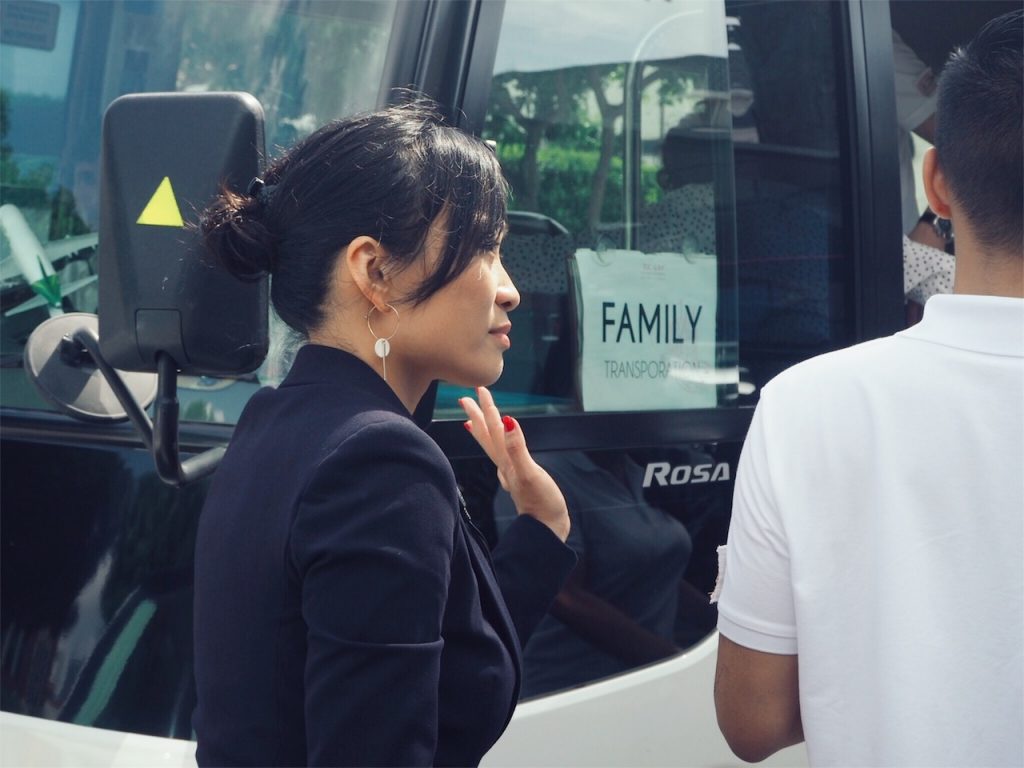
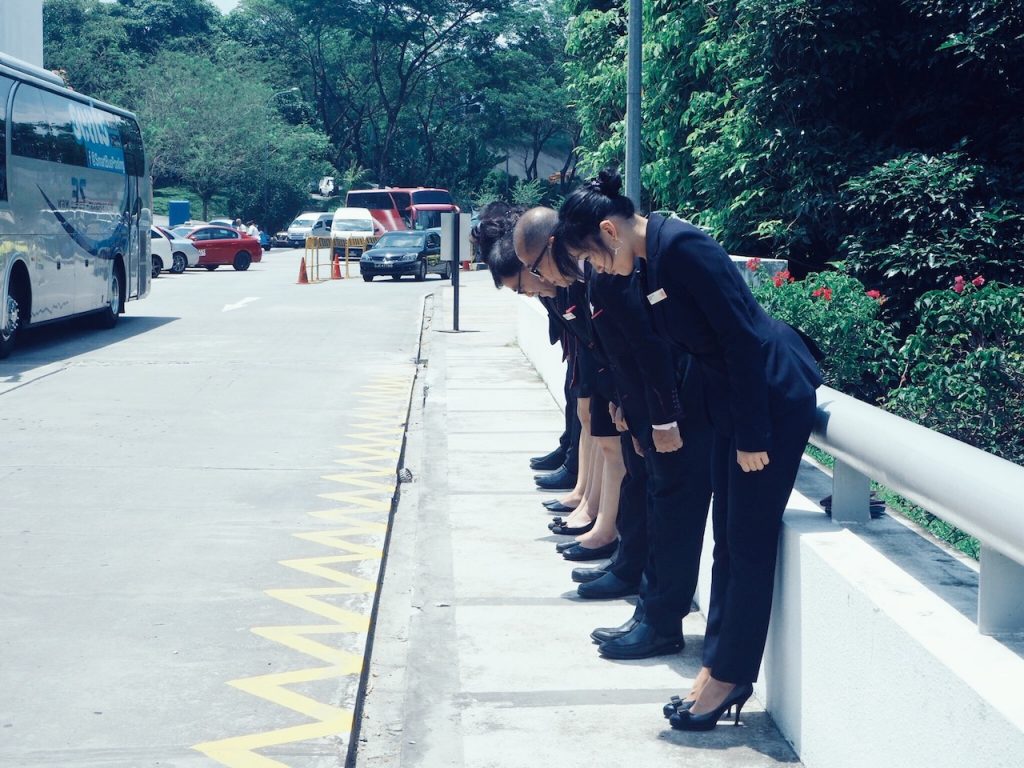
11:15 AM: Mandai Crematorium and Columbarium
Angjolie stands at the back of the hall during the funeral service.
After all the flowers have been placed on the casket by individual family members and guests, the funeral team wheels the casket away. The silence in the hall is broken by the occasional sob from the children of the deceased.
It is hard for me not to choke up, but Angjolie easily maintains her professionalism. She accompanies the deceased’s wife throughout the service, showing empathy and concern.
After the service, she efficiently ushers the family and guests out of the hall.
Angjolie and team have set up a small food station at a corner in the lobby of the crematorium for the family to fill their stomachs before heading off for lunch and then back to the wake. Her team directs the family onto the buses, then bows together as a mark of respect for the family as the buses exit the driveway.
At long last, Angjolie can take a breather—but only for a few minutes.
I wonder if she ever cracks under the emotional strain or if she has gotten used to dealing with such intense emotions everyday.
She says, “Some funerals will hit us hard, but you must remember that whatever you do is for the family. Once, this girl who was the funeral arranger kept crying, so I had to step in. Always remember: family first, TLC second, and we as individuals are last priority.
Being a funeral director, she adds, her job is to direct. She has to remain detached, so the family has a ‘strong’ presence whom they can turn to.
While Angjolie finishes the leftover finger food from the food station, she debriefs her staff and catches up on any work issues they have. At the same time, she replies messages and takes calls on both her phones.
There are many things to do: a new family wants a quote for a funeral; she has to give a talk the next day at Yale-NUS about purposeful aging and meaningful endings, just one of the many conferences she gets invited to; and the second son of today’s deceased has just called to ask what time his family needs to arrive at the temple today.
In Angjolie’s line of work, life (and I suppose, death) must go on.
This post is not sponsored by The Life Celebrant. Have something to say about this story? Write to us at community@ricemedia.co.

